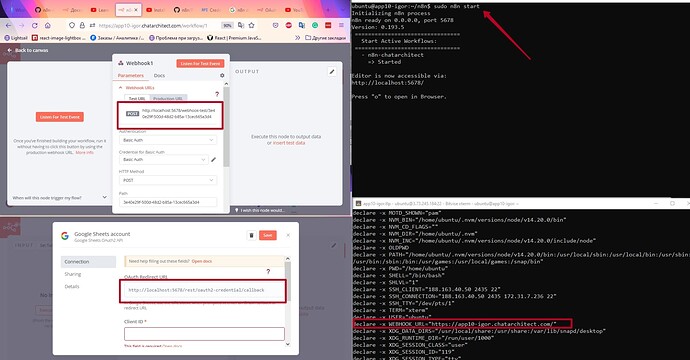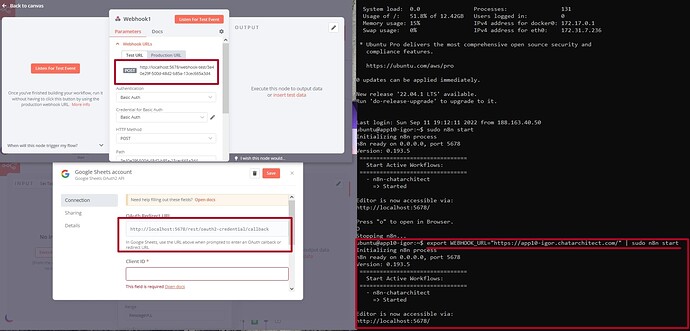I'm attempting to establish a connection with ClickUp. When I set up an OAuth2 connection, the OAuth Callback URL appears as http://localhost:5678/rest/oauth2-credential/callback , instead of the subdomain where callin.io is installed. Do I need to adjust the permalink in a configuration setting? Thanks, Josh
Yes, your setup is not complete. You can find instructions for a production setup here:
What is specifically missing here is the environment variable WEBHOOK_TUNNEL_URL. You can find the documentation here:
Hello Jan, how are you? The documentation mentioned above for setting up WEBHOOK_TUNNEL is no longer available - do you have the updated link? We are trying to set up the callback URL. Thanks!
You might find this helpful:
Hello!
Were you able to configure the WEBHOOK_TUNNEL variable? Please let us know if you require further assistance.
![]()
Hi,
I'm currently running a self-hosted instance of callin.io on a Debian VM.
I haven't been able to find a way to configure the WEBHOOK_TUNNEL variable to create credentials for Microsoft via OAuth.
Regards,
Arnaud
Hello, it appears the parameter is now WEBHOOK_URL. I'll investigate this further…
I confirm this solution; it's the correct command to adjust the webhook URL in the "auth settings" for the HTTP request. Thank you.
I'm encountering the same issue.
I'm attempting to establish a connection with Google Sheets.
When I configure an OAuth2 connection, the OAuth Callback URL defaults to
http://localhost:5678/rest/oauth2-credential/callback , instead of using the subdomain where callin.io is hosted.
I tried setting it via export WEBHOOK_URL= https://mysite.com , but this didn't resolve the problem.
Is there a configuration setting I need to adjust for the permalink?
Thank you,
Hello,
Simply using the webhook URL should suffice, though the method for applying this option might vary based on your specific setup.
When using Docker, I prefer to recreate the container to ensure everything is updated correctly.
Hello Jon,
I installed it using npm.
Do I understand correctly that when installing with Docker, this issue is resolved by specifying export WEBHOOK_URL?
If that's the case, is it correct to proceed by running npm uninstall callin.io and then reinstalling with Docker?
Hello,
You can also utilize it with npm if you configure the environment variable and then launch callin.io.
Hey,
Can you try…
export WEBHOOK_URL=“ https://app10-igor.chatarchitect.com/” | sudo callin.io start

